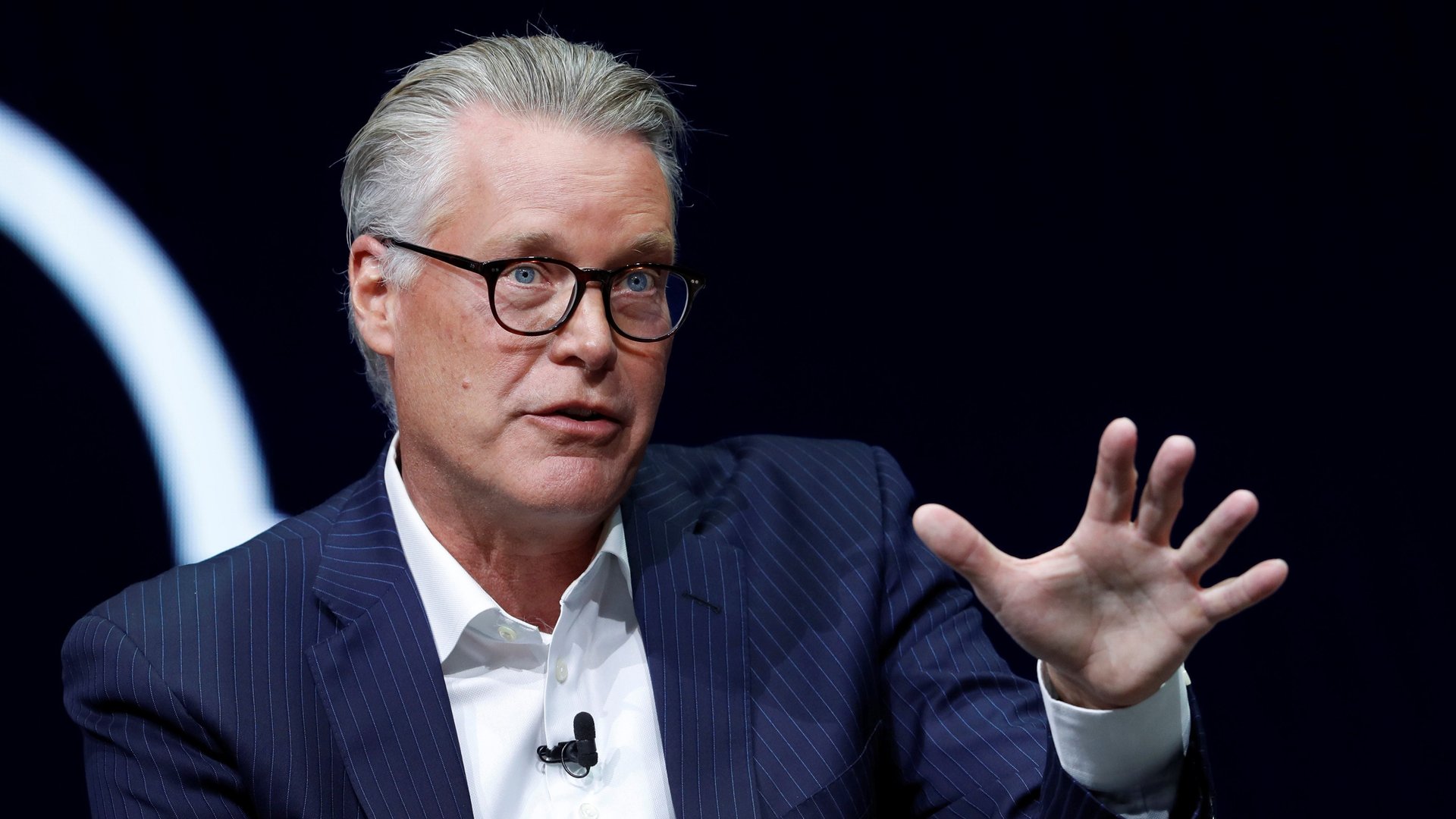Woke incorporated
To modern workers everywhere,


To modern workers everywhere,
In 2012, Bank of America executive Cathy Bessant made news when she spoke out against a proposed constitutional amendment in North Carolina to ban same-sex marriage and civil unions in her employer’s headquarters state. It seemed shocking that anyone in finance would risk alienating customers of differing political persuasions, particularly on such a hot-button issue. “Amendment One is a direct challenge to our ability to compete nationally for jobs and economic growth,” she said in a video panning the proposal. “Large corporations hate this kind of controversy.” Underscoring the point, Bank of America claimed neutrality on the issue and suggested Bessant was acting in a personal capacity.
Less than a decade later, executives in neighboring Georgia are also speaking out against discriminatory rules—only this time, just as Walmart CEO Doug McMillon did in 2015 when he lobbied against a bill that would have allowed Arkansas businesses to deny customers on the basis of religious freedom—they’re doing so explicitly on behalf of their companies.
Delta Air Lines CEO Ed Bastian, who initially got criticized for not publicly denouncing new legislation to restrict voting rights in his airline’s home state, made clear in a memo to employees that their workplace was no idle observer. “Since the bill’s inception, Delta joined other major Atlanta corporations to work closely with elected officials from both parties, to try and remove some of the most egregious measures from the bill,” Bastian wrote. “…However, I need to make it crystal clear that the final bill is unacceptable and does not match Delta’s values.” For this, the Wall Street Journal editorial board labeled Bastian “woke and weak,” and suggested he followed a leftist mob down “the path of least political and commercial resistance.”
Is CEO activism the correct way to go? I wouldn’t presume to know—what perhaps feels right in the moment could have unexpected repercussions years from now. But critics of the trend seem to want to have it both ways. On the one hand, the Journal’s editorial board marvels at the gall of these executives, while on the other it laments that CEOs are taking positions that align with their business interests. Exactly who is leading whom here?
Business has always had an influence—many would say an undue one—on political issues. If executives are now comfortable with publicly speaking out against antiquated marriage laws and racist voting restrictions, then good on them for thinking beyond tax policy and regulation in terms of where to flex their muscle, and for using their platforms to condemn discrimination. And if public sentiment on social issues is turning fast enough that executives simply feel pressured to keep up with their employees and customers, then good on them for recognizing what’s at stake.—Heather Landy
+ Explore more coverage of CEO activism in Quartz at Work:
- What’s the ethical case for CEOs publicly endorsing candidates?
- Apple’s Tim Cook has pushed CEO activism into uncharted territory
- Why the new CEO activism is bad for everyone
- Should management be political? That is the wrong question
Five things we learned this week
US employees broadly support mandatory Covid-19 vaccination. Finance and tech workers are the strongest supporters of vaccine requirements.
There are easy ways to support the leadership potential of Generation Z. For example, pay them a living wage and get their identities right.
Klarna’s path to Europe’s most valuable startup began with utter defeat. In a pitch competition similar to the show Shark Tank, with an audience of luminaries including the king of Sweden and H&M’s chairman, Klarna’s buy-now-pay-later concept came in last.
One million new jobs a month isn’t enough. If that’s all America can muster, it will take 14 months to get employment back to pre-pandemic levels.
Work(out) from home hasn’t hurt demand for $100 yoga pants. Lululemon could potentially surpass Nike as the top women’s activewear brand in the US this year.
You’re invited: Make business better
Thanks to unprecedented investment and collaboration between governments and the pharmaceutical industry, Covid-19 vaccines were developed in record time. Our current challenge is distributing them quickly and fairly. How do we ensure equitable global access to vaccines and other critical drugs?
Join Quartz editor in chief Katherine Bell and a panel of experts for a live discussion today (April 7) from noon-1pm US eastern time. Click here to register and to submit a question in advance.
30-second case study
In response to the killing of George Floyd and the resurgence of the Black Lives Matter movement, an array of companies large and small have committed to getting involved with America’s historically black colleges and universities (HBCUs). Harold Bell, director of Spelman College’s office of career planning and development, tells Quartz at Work’s Michelle Cheng that his seven-person department has been flooded this year with emails and phone calls from hundreds of companies, each armed with a list of diversity recruitment initiatives.
The increased outreach has been stressful, he says, as handling recruiters is only part of his office’s job. It isn’t just placement officers who are being inundated as a result. Data from Handshake, a site that connects employers with colleges and college students, show that after George Floyd’s murder in Minnesota, HBCU students saw a 220% increase in the average number of messages they received from recruiters on the platform.
Catrina DosReis, director of the career and professional development center at North Carolina Central University, another HBCU, says that 60 organizations took part in a business and IT recruitment fair back in September, double the previous year’s participation. “I think it’s going to enhance our employment outcomes,” DosReis says of the new interest in HBCUs among employers. “I don’t think we want to go back to, like, begging and, you know, ‘shucking and jiving’ for employers to come on campus.” But the career center had a “sobering moment” a few weeks after the event, DosReis says, when the staff realized they couldn’t take all of the inbound calls, and wanted to make sure students were being matched with the right jobs.
The takeaway: The new attention being paid to HBCUs is overdue, but it’s not without its drawbacks. The schools couldn’t possibly have prepared for the unprecedented flood of corporate diversity needs that are now urgently, and somewhat haphazardly, showing up (whether in person or virtually) on campus. “We need to be more intentional about what we’re doing here,” DosReis says of her department’s involvement with the sudden crush of recruiters. “So we’re now starting to have these conversations.”
HBCUs were established prior to 1964, during a period of legal segregation in America. They typically have lower graduation rates and fewer resources than other US universities; Harvard’s endowment is $40.9 billion, while Spelman’s is $390 million. Spelman’s Bell says he’s been working with employers to explain that, from the school’s point of view, a partnership is not just about job openings and companies’ access to campus—it’s also about investing in scholarships and infrastructure that support students throughout their college careers.
Read more of Michelle’s reporting on how HBCUs are handling the flood of diversity recruiting efforts, in this membership exclusive. Not yet a Quartz member? Test us out with a free trial.
Pro tip!
Surveys show that workers would prefer a hybrid work model in which they go into an office a few days per week. But Darren Murph, head of remote work culture at GitLab, tells Quartz that smaller companies ought to consider keeping executives out of the office “so they send the right signal that the office is not the epicenter of power. The office is not the place where you come to get promoted.”
Quartz field guide interlude: What a year of Covid has done to work

By the numbers:
6.9%: Jobs posting on Indeed in February 2021 that are for remote positions, vs 2.9% in January 2020
79%: Global survey respondents who say “the ability to live anywhere” would be important to them
2.5: Additional hours per week people are working on average during the pandemic
61%: Corporate leaders (more likely to be men who worked from home in executive jobs) say they’re “thriving” right now, according to a 2021 Microsoft survey
44%: Remote workers who say their mental health has declined in the past year
Read our complete guide to what’s different at work now. It includes these articles:
- How work has changed a year into the pandemic
- Quiz: How much do you know about what employees want now?
- The case against cutting remote workers’ big-city salaries
- How HBCUs are responding to the flood of corporate diversity initiatives
- How to support employee mental health at every level of the firm
Words of wisdom
“Gen Zers have been our teachers and leaders. They show up on the front lines as leaders of social movements. They take conscious consumerism seriously and show the rest of us how to be savvy social media operators. They are storytellers and communicators who hold true to their values and beliefs. They have stepped up to lead on gun violence prevention, environmental policy, and racial justice. They, in partnership with millennials, will soon become the largest voting bloc.”—Josh Feldman, vice president, leadership and student experiences, Hillel International
ICYMI
What recourse is there for a socially conscious consumer when a purportedly socially conscious brand abuses their trust? A lawsuit might lead to a payout for damages, but it won’t necessarily force the company to right its wrong. In December 2019, Quartz’s Marc Bain reported on the new idea of “identity harm” and spoke with a legal scholar who wants to hold corporations to the moral claims they make. Will the concept ever catch on?
You got The Memo!
Our best wishes for a productive, purposeful week. Please send workplace news, college placement-office reinforcements, and Gen Z leadership skills to [email protected]. Get the most out of Quartz by downloading our app and becoming a member. This week’s edition of The Memo was produced by Heather Landy, Michelle Cheng, Sarah Todd, and Itika Sharma Punit.